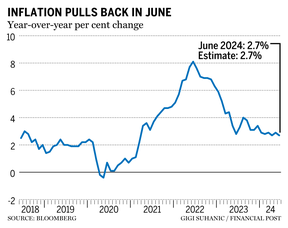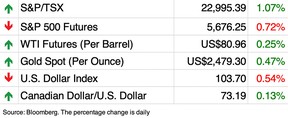Slowing Inflation in both countries expected to limit the rate gap and could buffer the Canadian dollar

Article content

The divergence in interest rates between Canada and the United States became a hot topic and a percolating worry for economists when it looked like the Bank of Canada would feast on cuts while the U.S. Federal Reserve sat pat.
Now, some economists are starting to believe there may be less need to worry about such a divergence, given the latest inflation data released in both countries.
Advertisement 2
Article content
Statistics Canada on Tuesday said inflation slowed to 2.7 per cent year over year in June from 2.9 per cent in May, all but cementing expectations of a second 25-basis-point interest rate cut by the Bank of Canada on July 24.
U.S. inflation, released last week, showed the core consumer price index (CPI) rising at its slowest pace in more than three years, spurring markets to price in a possible September rate cut by the Fed. Previously, markets had expected it to cut only once in December.
“The BoC’s latest round of business and consumer surveys showed that inflation expectations are easing off on balance, which will also provide the BoC with more comfort to continue to cut rates,” Katherine Judge, a senior economist at CIBC Capital Markets, said in a note. “And it’s also looking like they will have to worry less about policy divergence with the Fed that is set to cut in September.”
Another economist echoed Judge’s take on divergence.
“Disinflation south of the border points to a Fed rate cut in September, which limits the divergence in the policy rates between the Bank (of Canada) and the Fed,” Tu Nguyen at assurance, tax and consulting firm RSM Canada LLP said.
Article content
Advertisement 3
Article content
Interest rate divergence swept onto the economic radar in the spring as the U.S. economy steamed ahead of its northern counterpart and economists began to forecast that the Bank of Canada would have to cut interest rates many more times than the Fed.
Economists worried the resulting chasm between the two benchmark lending rates would bring about dire consequences for the loonie, since lower rates would result in the Canadian currency dropping in value, forcing investors to turn elsewhere for a better return. Meanwhile, a cheaper currency could feed inflation because it would make purchasing goods from outside the country more expensive.
Now that inflation is apparently behaving, it could mean a narrower spread between the the two central bank rates.
Nguyen expects a divergence of 100 basis points between the Bank of Canada and Fed rates at year-end, with their borrowing rates closing 2024 at four per cent and five per cent, respectively.
“The loonie will lose value in the short run as the bank’s policy rate diverges from the Fed,” she said in an email. “However, the U.S. June CPI report suggests that disinflation is underway south of the border, too, which means that both central banks will be cutting rates into 2025.”
Advertisement 4
Article content
CIBC is forecasting cuts totalling 100 basis points in Canada this year, including the one in June, and 50 basis points in the U.S. should the Fed initiate a first cut in September.
“Divergence is probably less of an issue from the (Bank of Canada’s) perspective now that we are getting closer to Fed cuts, which will work to limit policy divergence,” Judge said in an email. “That would leave the spread between the two banks within historical norms by the end of the year.”
As a result, the loonie might not be looking as bad as it once did, as some economists were calling for it to fall as low as 69 U.S. cents at the start of the year.
Instead, Judge said CIBC thinks the loonie could end the year not much weaker than where it currently sits — around 73 U.S. cents — as the “overvalued” U.S. dollar starts to fall.
“We expect to see broad (U.S. dollar) softness, with the greenback starting from an overvalued position against other majors on trade fundamentals, and likely losing some of its earlier flight-to-safety gains as a global easing in monetary policy raises hopes for better global activity in 2025,” she said.
Advertisement 5
Article content
CIBC is currently calling for the loonie to end the year at 72.5 U.S. cents.
Sign up here to get Posthaste delivered straight to your inbox.

Canada’s annual inflation rate slowed to 2.7 per cent in June from 2.9 per cent a month earlier, ahead of a Bank of Canada interest rate decision next week.
A slowdown in gas prices — which were up 0.4 per cent year-over-year compared to a 5.6 per cent increase in May — was attributed to an announcement by the Organization of the Petroleum Exporting Countries (OPEC) that it will re-open refineries for production following a spring maintenance shutdown. Excluding gasoline, inflation would have decelerated to 2.8 per cent.
Another sticky point was the cost of food bought at stores, which rose year-over-year by 2.1 per cent in June, up from 1.5 per cent in May. Over the past three years, the price of food purchased in stores has risen by 21.9 per cent, but inflation in this category has been trending down since January of 2023. — Jordan Gowling, Financial Post
- Nova Scotia Premier Tim Houston hosts the 2024 summer meeting of Canada’s premiers in Halifax
- Today’s data: Canada international securities transactions, U.S. building permits, housing starts and capacity utilization. Federal Reserve releases Beige Book
- Earnings: Johnson & Johnson, Alcoa Corp., Equifax Inc., Kinder Morgan Inc., United Airlines Holding Inc., FortisBC Inc., TransAlta Renewables Inc.
Advertisement 6
Article content

Recommended from Editorial
There are many successful Canadians who are exploring or outright leaving this country. Reliable statistics are hard to come by, but tax practitioners have been kept very busy because economic and taxation policies matter, especially the messaging surrounding such policies. Tax expert Kim Moody argues that the biggest cause of successful people leaving Canada is that they feel that they are being attacked in their own country and are not appreciated for all their contributions. Read his full column here
FP Answers
Are you worried about having enough for retirement? Do you need to adjust your portfolio? Are you wondering how to make ends meet? Drop us a line at aholloway@postmedia.com with your contact info and the general gist of your problem and we’ll try to find some experts to help you out while writing a Family Finance story about it (we’ll keep your name out of it, of course). If you have a simpler question, the crack team at FP Answers led by Julie Cazzin or one of our columnists can give it a shot.
Advertisement 7
Article content
McLister on mortgages
Want to learn more about mortgages? Mortgage strategist Robert McLister’s Financial Post column can help navigate the complex sector, from the latest trends to financing opportunities you won’t want to miss. Read them here
Today’s Posthaste was written by Gigi Suhanic, with additional reporting from Financial Post staff, The Canadian Press and Bloomberg.
Have a story idea, pitch, embargoed report, or a suggestion for this newsletter? Email us at posthaste@postmedia.com.
Bookmark our website and support our journalism: Don’t miss the business news you need to know — add financialpost.com to your bookmarks and sign up for our newsletters here.
Article content












